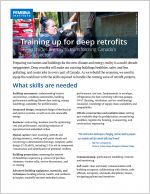
Commercial, institutional, and residential buildings are responsible for about a third of carbon pollution in the U.S., and about a fifth of carbon pollution in Canada, constituting the largest source of emissions in North America. Worldwide, they account for about a third of energy-related emissions, and continue to grow: over 80 billion square metres (900 billion square feet), will be built and rebuilt in urban areas by 2030, an area roughly equal to 60% of the current global building stock.
One strategy to reliably reduce emissions from buildings at a low cost, while also improving durability, comfort, and resilience, is to improve the thermal performance of building enclosures. By increasing the insulation and airtightness of walls, roof, and windows, it is possible to reduce the energy used for heating buildings by up to 90% compared to common practice. This ‘passive’ approach to thermal comfort — in contrast to active systems based on a constant supply of conditioned air by HVAC systems — is the cornerstone of the passive house movement and a strategy used by thousands of green buildings around the world.
Accelerating Market Transformation for High-Performance Building Enclosures aims to provide decision-makers in government and industry a picture of the state of the passive house market, an assessment of its energy benefits, costs, and risks, and a summary of barriers to market transformation and policy solutions advanced in Europe and North America. Reducing emissions from buildings will require both de-carbonizing the energy supply and reducing energy demand across all energy end uses. This report, however, focuses primarily or the reduction of heating and cooling loads.
This study was made possible by a Carbon Neutral Cities Alliance Innovation Fund grant from the Urban Sustainability Directors Network, a Greenest City grant from the Vancouver Foundation, and the support of the Real Estate Foundation of B.C.


